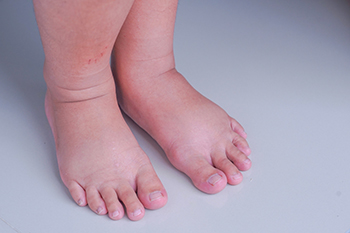Connect With Us
Blog
Items filtered by date: October 2022
Paring Down Foot Corns

Foot corns are just one of the many types of foot conditions that can be of great annoyance to a patient. A corn is a hard, thick spot of skin that typically develops on a person’s foot as the result of friction or pressure. One way in which a medical professional, such as a podiatrist, might attempt to treat persistent corns is by paring down the affected skin. More specifically, a podiatrist can use a scalpel blade to make the skin less thick. In some cases, multiple sessions may be needed for a podiatrist to completely pare down the affected skin. After a corn has been pared down, there is a chance that it may return if the patient does not wear footwear that fits properly. If you have corns, it is recommended that you contact your podiatrist today for treatment.
If you have any concerns regarding your feet and ankles, contact Dr. James D. McAlexander of Gig Harbor Foot and Ankle Clinic. Our doctor will treat your foot and ankle needs.
Corns: What Are They? and How Do You Get Rid of Them?
Corns can be described as areas of the skin that have thickened to the point of becoming painful or irritating. They are often layers and layers of the skin that have become dry and rough, and are normally smaller than calluses.
Ways to Prevent Corns
There are many ways to get rid of painful corns such as wearing:
- Well-fitting socks
- Comfortable shoes that are not tight around your foot
- Shoes that offer support
Treating Corns
Treatment of corns involves removing the dead skin that has built up in the specific area of the foot. Consult with Our doctor to determine the best treatment option for your case of corns.
If you have any questions please feel free to contact our office located in Gig Harbor, WA . We offer the newest diagnostic and treatment technologies for all your foot and ankle needs.
Various Reasons the Feet May Become Swollen

The medical term for swelling is called edema. Edema can be caused for several reasons and it is common in the feet and ankles. Many pregnant women can have swollen feet, and this symptom may become more pronounced during the third trimester. Additionally, existing kidney disease may contribute to developing edema, and diabetic patients may see evidence of this on their feet. Sitting on a plane or in a car for extended periods may cause this condition to occur due to a lack of movement, which may cause reduced blood circulation. People who have edema may have skin that is shiny around the affected area and gravity can increase the swelling in the feet. Edema may be controlled by implementing lifestyle changes. These can include reducing salt intake, wearing compression stockings, and elevating the feet above the heart. If you are experiencing swollen feet, it is suggested that you speak with a podiatrist who can diagnose and treat this condition.
Swollen feet can be a sign of an underlying condition. If you have any concerns, contact Dr. James D. McAlexander of Gig Harbor Foot and Ankle Clinic. Our doctor can provide the care you need to keep you pain-free and on your feet.
Swollen feet are a common ailment among pregnant women and people who stand or sit for extended periods. Aging may increase the possibility of swollen feet and patients who are obese often notice when their feet are swelling too. There may be medical reasons why swollen feet occur:
- Phlebitis - A condition that causes the veins to become inflamed and can also cause leg pain.
- Liver disease - This may lead to low blood levels of albumin which is a protein. This can cause fluid in the blood to pass into the tissues and several areas of the body can become swollen.
- Heart failure - When the heart doesn’t pump properly the blood that is normally pumped back to the heart can pool in the veins of the legs causing swollen feet.
- Kidney disease - One of the main functions of the kidneys is releasing excess fluid in the body. This type of condition can make it difficult for the kidneys to function properly, and as a result the feet may become swollen.
- Deep-vein thrombosis (DVT)- This is a serious condition where blood clots form in the veins of the legs. They can block the return of blood from the legs to the heart which may cause the feet to swell. It is important to be treated by a podiatrist if this condition is present.
Swollen feet can also be caused by bone and tendon conditions, including fractures, arthritis, and tendinitis. Additionally, there may be skin and toenail conditions and an infection may cause the feet to swell. Patients who take medicine to treat high blood pressure may be prone to getting swollen feet.
Many patients elevate their feet to help relieve the swelling and this is generally a temporary remedy. When a podiatrist is consulted the reason behind the swelling can be uncovered and subsequently treated.
If you have any questions please feel free to contact our office located in Gig Harbor, WA . We offer the newest diagnostic tools and technology to treat your foot and ankle needs.
Several Reasons Why Stress Fractures Can Occur

Many people who develop stress fractures often continue to run through the pain that this foot condition can cause. It is a hairline fracture and may be more prevalent among people who have osteoporosis. The foot bones absorb the stress of the body, and this can easily occur if proper warmups and cool-downs are not performed. Symptoms that are generally associated with stress fractures include bruising, swelling, and tenderness in addition to difficulty in completing daily activities. Some factors can contribute to incurring a stress fracture. These can consist of having previous fractures, a lack of vitamin D, or running and jumping on uneven surfaces. An MRI is often needed to properly diagnose a stress fracture and an X-ray may follow. If you feel that you have developed this type of fracture, please consult with a podiatrist who can guide you toward the correct treatment techniques, which often begin with resting and elevating the affected foot.
Stress fractures occur when there is a tiny crack within a bone. To learn more, contact Dr. James D. McAlexander from Gig Harbor Foot and Ankle Clinic. Our doctor can provide the care you need to keep you pain free and on your feet.
How Are They Caused?
Stress fractures are the result of repetitive force being placed on the bone. Since the lower leg and feet often carry most of the body’s weight, stress fractures are likely to occur in these areas. If you rush into a new exercise, you are more likely to develop a stress fracture since you are starting too much, too soon. Pain resulting from stress fractures may go unnoticed at first, however it may start to worsen over time.
Risk Factors
- Gender – They are more commonly found in women compared to men.
- Foot Problems – People with unusual arches in their feet are more likely to develop stress fractures.
- Certain Sports – Dancers, gymnasts, tennis players, runners, and basketball players are more likely to develop stress fractures.
- Lack of Nutrients – A lack of vitamin D and calcium may weaken the bones and make you more prone to stress fractures
- Weak Bones – Osteoporosis can weaken the bones therefore resulting in stress fractures
Stress fractures do not always heal properly, so it is important that you seek help from a podiatrist if you suspect you may have one. Ignoring your stress fracture may cause it to worsen, and you may develop chronic pain as well as additional fractures.
If you have any questions, please feel free to contact our office located in Gig Harbor, WA . We offer the newest diagnostic and treatment technologies for all your foot care needs.
Common Causes of Toe Pain

Toe pain can be very uncomfortable. The toes contain bones, ligaments, tendons, nerves, and blood vessels. An injury or infection to any one of these components can lead to toe pain. Pain in the toe region can be throbbing, piercing, continuous, or can briefly last. Aging can cause toe pain as the structures in the toe are subjected to so much wear and tear over a lifetime and this, in and of itself, can lead to toe pain. An injury to the toes, such as a stress fracture, dislocation, or sprain can damage them and cause pain. Bunions, athlete’s foot, and arthritis are also common causes of toe pain. When toe pain is the result of other physical conditions like peripheral arterial disease, or if it gives rise to other complications and leads to an infection, it can be dangerous, and a medical professional should be contacted immediately. If you are experiencing toe pain, you may or may not know the cause. A podiatrist can assist in providing a diagnosis and suggest an appropriate treatment.
Toe pain can disrupt your daily activities. If you have any concerns, contact Dr. James D. McAlexander of Gig Harbor Foot and Ankle Clinic. Our doctor can provide the care you need to keep you pain-free and on your feet.
What Causes Toe Pain?
Most severe toe pain is caused due to a sports injury, trauma from dropping something heavy on the toe, or bumping into something rigid. Other problems can develop over time for various reasons.
Toe pain can be caused by one or more ailments. The most common include:
- Trauma
- Sports injury
- Wearing shoes that are too tight
- Arthritis
- Gout
- Corns and calluses
- Hammertoe
- Bunions
- Blisters
- Ingrown toenails
- Sprains
- Fractures (broken bones)
- Dislocations
When to See a Podiatrist
- Severe pain
- Persistent pain that lasts more than a week
- Signs of infection
- Continued swelling
- Pain that prevents walking
Diagnosis
In many cases the cause of toe pain is obvious, but in others, a podiatrist may want to use more advanced methods to determine the problem. These can range from simple visual inspections and sensation tests to X-rays and MRI scans. Prior medical history, family medical history, and any recent physical traumatic events will all be taken into consideration for a proper diagnosis.
Treatment
Treatments for toe pain and injuries vary and may include shoe inserts, padding, taping, medicines, injections, and in some cases, surgery. If you believe that you have broken a toe, please see a podiatrist as soon as possible.
If you have any questions please feel free to contact our office located in Gig Harbor, WA . We offer the newest diagnostic tools and technology to treat your foot and ankle needs.
Blog Archives
- December 2024
- November 2024
- October 2024
- September 2024
- April 2023
- March 2023
- February 2023
- January 2023
- December 2022
- November 2022
- October 2022
- September 2022
- August 2022
- July 2022
- June 2022
- May 2022
- April 2022
- March 2022
- February 2022
- January 2022
- December 2021
- November 2021
- October 2021
- September 2021
- August 2021
- July 2021
- June 2021
- May 2021
- April 2021
- March 2021
- February 2021
- January 2021
- December 2020
- November 2020
- October 2020
- September 2020
- August 2020
- July 2020
- June 2020
- May 2020
- April 2020
- March 2020
- February 2020
- January 2020
- December 2019
- November 2019
- October 2019
- September 2019
- August 2019
- July 2019
- June 2019
- May 2019
- April 2019
- March 2019
- February 2019
- January 2019
- December 2018
- November 2018
- October 2018
- September 2018
- August 2018
- July 2018
- June 2018
- May 2018
- April 2018
- March 2018
- February 2018
- January 2018
- December 2017
- November 2017
- October 2017

